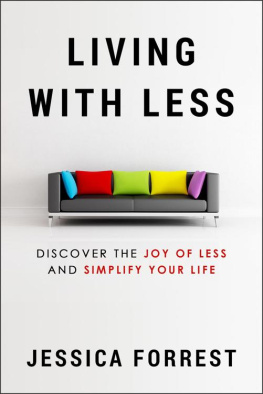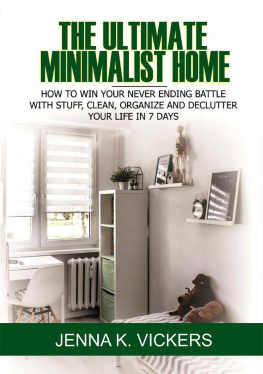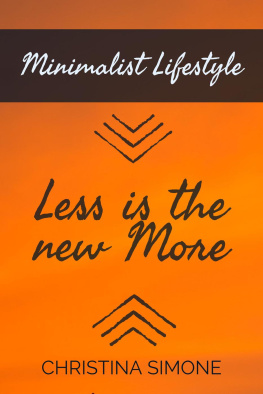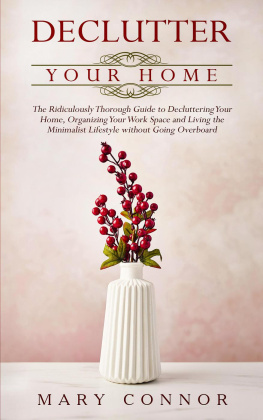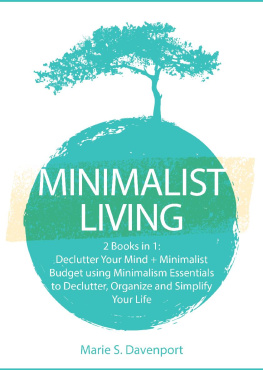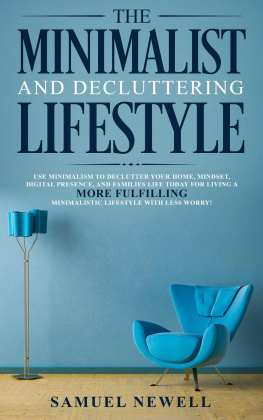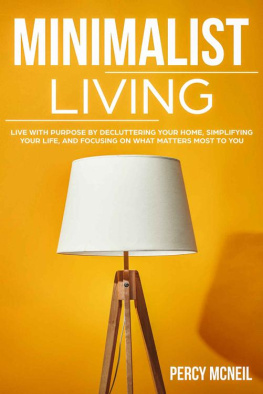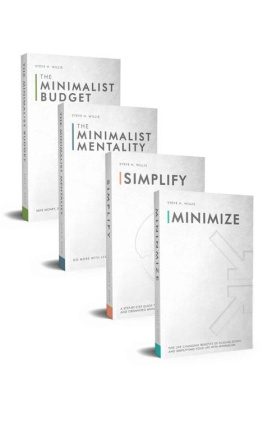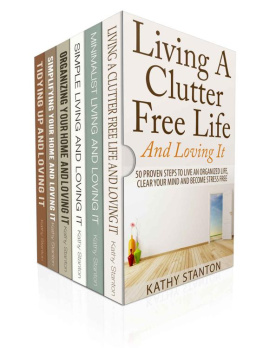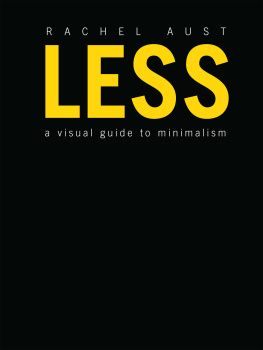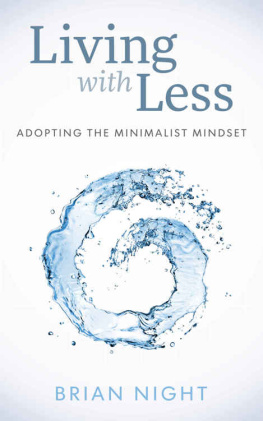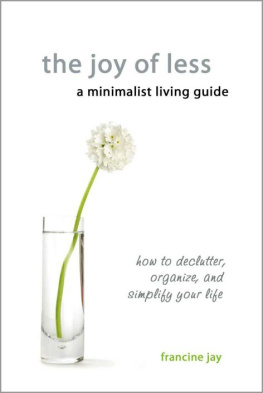Living With Less
Discover the Joy of Less and Simplify Your Life
Jessica Forrest
Table of Contents
Copyright 2016 by Jessica Forrest - All rights reserved.
This document is geared towards providing exact and reliable information in regards to the topic and issue covered. The publication is sold with the idea that the publisher is not required to render accounting, officially permitted, or otherwise, qualified services. If advice is necessary, legal or professional, a practiced individual in the profession should be ordered.
- From a Declaration of Principles which was accepted and approved equally by a Committee of the American Bar Association and a Committee of Publishers and Associations.
In no way is it legal to reproduce, duplicate, or transmit any part of this document in either electronic means or in printed format. Recording of this publication is strictly prohibited and any storage of this document is not allowed unless with written permission from the publisher. All rights reserved.
The information provided herein is stated to be truthful and consistent, in that any liability, in terms of inattention or otherwise, by any usage or abuse of any policies, processes, or directions contained within is the solitary and utter responsibility of the recipient reader. Under no circumstances will any legal responsibility or blame be held against the publisher for any reparation, damages, or monetary loss due to the information herein, either directly or indirectly.
Respective authors own all copyrights not held by the publisher.
The information herein is offered for informational purposes solely, and is universal as so. The presentation of the information is without contract or any type of guarantee assurance.
The trademarks that are used are without any consent, and the publication of the trademark is without permission or backing by the trademark owner. All trademarks and brands within this book are for clarifying purposes only and are the owned by the owners themselves, not affiliated with this document.
Introduction
Minimalism is a movement that is gaining popularity throughout the west. In an era gripped by materialism and consumerism, minimalism argues that we can learn to be happier by owning less, not more. Minimalists advocate that you should de-clutter your life, removing unnecessary possessions, to give you the physical and emotional space you need to focus on the aspects of your life that bring you joy.
In this guide you will learn everything about minimalism. In the first chapter we will explore the philosophy and perspective of minimalism in greater depth, discovering where minimalism came from and why you should start to de-clutter.
The second chapter will tutor you in the various ways you can train yourself to think differently about the items around you don't need, explaining the various pitfalls and misconceptions that lead us to hoard items in the first place and how to overcome them.
The next chapters will take you through the process of de-cluttering your house one-room at a time, with specific and handy tips for the living room, bathroom, bedroom, kitchen & garage.
Next we will cover the topics of minimalism & clothes, exploring the way that our identity and confidence becomes dependent on our clothes and how to part with our beloved garments. The next chapter will deal with our obsession with technology and the virtual world, especially the internet, computer gaming and social media.
Finally the last chapter will wrap things up, discussing the top 10 tips to consider on your minimalist journey. Let's get going!
What is Minimalism?
At the heart of western society there is an undercurrent of un-fulfillment. Every day we wake up, eat, wash, go to our jobs, come home, and make dinner and then go back to sleep. At some point along our lives we lost that sense of wonder and direction that we possessed when we were younger.
We go through the motions of our lives without being connected or immersed in what we are doing. As a result a myriad of different perspectives and philosophies have arisen by different thinkers in order to tell us what we are doing wrong and how we should fix it.
Some of us tell us that we should travel and that our life is lackluster unless we are climbing mountains and constantly seeking new exotic challenges. Other views talk about the importance of success and aiming higher, climbing the business world and all of the hurdles it presents.
Minimalists look at the problem in a different way. The problem with our modern lifestyle is not that something is missing, it is the opposite; that we have far too much. We have so much stuff that we lose track of the few things that are important. We hoard clutter both physically and emotionally until the things that make us happy are buried under everything else. As a result our lives lack that vitality and spark that makes life truly worth living.
On the same vein, for minimalists, the way to reignite your life and reclaim your happiness is not found on foreign shores or in achievements in the business world, it is realizing what in your life already makes you happy and changing your life to revolve around that.
Although minimalism is undoubtedly a movement and an idea with deep spiritual notions, don't make the mistake of thinking that all minimalists are hermits, monks or deeply religious. Minimalists are generally indistinguishable from anyone else in a crowd; they are people you know, people at your workplace and people with ordinary lives. All that is required to be a minimalist is a simple change in your perspective.
To be precise, minimalists wage a peaceful war against clutter of all sorts. Regardless of whether we consider ourselves especially materialistic or not, an average person in the western world will grow to own a staggering amount of possessions throughout their lives.
From books, to games, to computers, laptops, phones, clothes, cars, dishes, cutlery, Christmas decorations, cleaning equipment, furniture, novelties, and food, the amount of sheer 'stuff' a person collects is overwhelming. Yet, underneath all these items a truth remains dormant and forgotten; most of these items are not necessary and very few contribute to your happiness in any meaningful way.
Take a moment and ask yourself how many items in your life that you need and how many items actually give you genuine pleasure and contentment. Look at your bookshelves, stocked with hundreds of different books. How many have you actually read all the way through? How many do you actually require for constant use? Can you really say that any of these books change your life for the better? Would you notice if one of these books went missing?
Minimalists have asked themselves these types of questions and more regarding every possession they own. Moreover minimalists have realized that in an honest and practical sense that most of their possessions are either completely unnecessary or do not make them happier so they get rid of them.
In addition to the realization that the majority of their possessions do not actively contribute to their happiness, minimalists also recognize that keeping unnecessary items actually makes their life more difficult and unhappier.
A bookshelf full of unread books is an eyesore it's a waste of space that could be left open, making your house feeling spacious and uplifting. It's also a chore in the sense that these books must be dusted and cleaned occasionally and must be organized and carefully arranged. If you do actually require a book for a specific reason it's not a simple task of just grabbing that book from where you made room for it.
Instead you must rummage and search through your amateur library, wasting time and energy in the process. If you ever need to move or change the position of your furniture than moving that bookshelf is a huge challenge just by itself.

